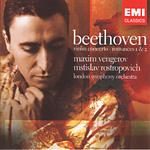First, let me say that this new Beethoven Violin Concerto recording undoubtedly will generate controversy: it stands as the polar opposite to Heifetz’s classic, invigoratingly paced rendition (not to mention the “authentic”-styled performances of recent vintage). Maxim Vengerov and Mstislav Rostropovich offer a large-scaled, big hearted reading that outdoes even the celebrated Perlman/Giulini recording in terms of grand sweep and broad tempos. Indeed, at 27 minutes Rostropovich’s first movement probably is the longest on disc. Nevertheless, patient, focused listening reveals an intensity of music making that belies the passage of time.
Vengerov certainly is unperturbed by his collaborator’s deliberateness, matching it with his own (all notes receive full value) and serving up luscious, full-bodied tone throughout. Even at these generous tempos, Vengerov’s emphatic phrasing underlines the music’s heroic and lyrical qualities, alternating bold strokes with tender touches as Beethoven requires. The arpeggiated main tune flows with stoic sweetness, a quality that pervades much of the slow movement as well. Yet Vengerov musters the requisite masculine energy for the finale, and especially for his two self-composed, brilliant and stylish cadenzas. Somewhat fleeter tempos grace the two Romances, though Vengerov and Rostropovich maintain the same seriousness of purpose here.
The London Symphony plays beautifully, revealing a wealth of inner detail under Rostropovich’s determined direction, and EMI provides yet another of its excellent Abbey Road productions. But for collectors the real concern is whether this will be the Beethoven Violin Concerto recording they’ll turn to for general listening. The answer is, not likely–but those open to a highly unorthodox experience with this masterpiece will find this recording intriguing, if not fascinating.
































